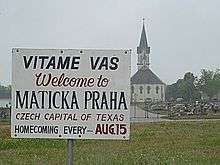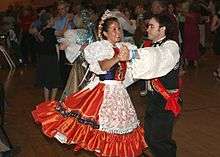Czech Texan

| Part of a series on |
| Ethnicity in Texas |
|---|
|
|
|
|
Czech Texans are residents of the state of Texas who are of Czech ancestry. As of the 2000 U.S. Census, there are 187,729 Czech-Americans living in Texas, the largest number of any state.[1]
History and culture

Historically, Czech Moravian settlements were found in Central Texas. "Czechs first settled in Texas in the 1840's, traveling from Bohemia, Moravia, and Austrian Silesia ... Czech settlers usually identified themselves as Austrian, German, Bohemian, Slovak or Moravian."[2] Although many Czech-Texans have experienced cultural assimilation, Czech celebrations and events continue to be held.[3]
Temple is home to the Czech Heritage Museum. A Fayetteville museum celebrates Texas's Czech settlement. In Caldwell is the Burleson County Czech Heritage Museum. In 2004, the Texas Czech Heritage and Cultural Center was opened in LaGrange. Houston's Czech Cultural Center promotes research of Czech history. Praha hosts the Praha Homecoming, also known as the Prazska Pout, which is celebrated with Catholic mass, food, singing and dancing. The city of West hosts Westfest every Labor Day, which includes a Koláče baking contest and a Taroky tournament. Crosby, northeast of Houston, hosts a Czech Fest and a Koláče Bake. The Czech Heritage Society of Texas has developed 14 chapters throughout the state.[2][4]
The National Polka Festival is an annual parade and festival held in Ennis, Texas celebrating the Czech heritage in the city. The 3-day festival is held every Memorial Day weekend. Most of the party halls offer a lunch or dinner with Czech foods such as klobása (sausage), sauerkraut, and koláče, as well as live entertainment with traditional polka music and dancing.[5]
The available literature about Texas Czechs and their history has expanded with advent of self-publishing, which has made it possible for amateur historians to distribute their works. One author has declared Mr. Albert Blaha of Houston "the Father of Texas Czech History", saying that "He is our own František Palacký."[6] Naše Dějiny, "a magazine of Texas Czech genealogy, history and culture" was founded in 1983.[6] The Library of the SPJST (Slavonic Benevolent Order of the State of Texas), founded in Temple in 1963, has holdings which "include over 20,000 volumes, the vast majority of which deal with Czech or Texas Czech topics."[6]
In 2013, The Texas Czech Genealogical Society hosted the "From Generation to Generation Research Conference" for those interested in exploring Czech ancestry.[7]
"The Heart Of Texas (HOT) Czechs" were one of the most famous Czech-Texan musical groups, founded by Ronnie Hurta, which played various polkas and waltzes, now had an instrumental album called "The Lone HOT Czech Plays Again".
Texas Czech dialect
12,805 Texans can speak the Czech language.[1]
Drawing on Boas’s model for interviewing speakers of the language and digitally cataloging the dialects, John Tomecek founded and Lida Cope of East Carolina University developed the Texas Czech Legacy Project at the University of Texas at Austin to document and preserve the dwindling language.[8][9][10]
Because the majority of Texas immigrants came from Moravia, the Czech spoken in Texas is largely characterized by Moravian dialects, which vary to some extent from the Bohemian dialects spoken by most Czech-Americans. Czech-language journalism has been very active in the state over the years. Thirty-three newspapers and periodicals have been published. As of 1993 one weekly newspaper, Našinec, published at Granger, and one monthly, Hospodář, published at West, were still being published entirely in Czech. Other periodicals such as Věstník and the Brethren Journal contained sections printed in Czech.[11]
In many cemeteries, we can read epitaphs in Czech (variously modified depending on different dialects and time. It's not always the correct form of Czech language, but it is an interesting example of holding the family tradition, culture and language.)
See also
- Czech Stop and Little Czech Bakery
- National Polka Festival
- Tejano music
- Texas German
- Czech Americans
- Austrian Americans
References
- 1 2 "Czech language" (PDF). U.S. English. Retrieved 2013-05-11.
- 1 2 Oommen, Sheena. "The Czech Texans - Texas Czechs - Vìtáme Vás Na Texas". Cultural Crossroads, regional and historical perspectives. Houston Institute for Cultre. Retrieved 2013-06-02.
- ↑ Dutkova-Cope, Lida (2003). "Texas Czech Ethnic Identity: So How Czech Are You, Really?". The Slavic and East European Journal. 47 (4 (Winter, 2003)): 648. Retrieved 2013-06-02.
- ↑ "The Czech Heritage Society of Texas". Retrieved 2013-06-02.
- ↑ "National Polka Festival". National Polka Festival. Retrieved 2012-05-12.
- 1 2 3 "From the Historiography of Czech Texas," Czechoslovak and Central European Journal, published by the Czechoslovak Society of Arts and Sciences, Summer/Winter 1990, pp. 134-143.
- ↑ Texas Czech Genealogical Society
- ↑ "Vanishing Voices: Linguists work with remaining speakers of dying languages to preserve cultural memories". University of Texas at Austin. 2010-01-11. Retrieved 2013-06-02.
- ↑ "2006 KJT Website Homepage". Archived from the original on January 13, 2012. Retrieved 2013-06-02.
- ↑ Cope, Lida. Creating a Digital Archive of Texas Czech: Applied Documentation for the Community, Education, and Research (PDF). Retrieved 2013-06-02.
- ↑ Machann, Clinton. "CZECHS". The Handbook of Texas Online. Texas State Historical Association (TSHA). Retrieved 2013-06-02.
- Dutkova, Lida (1998) Texas Czech: An ethnolinguistic study. Ph.D. dissertation. University of Arizona at Tucson.
- Eckert, E. (1993) Language change: The testimony of Czech tombstone inscriptions in Praha, Texas. In E. Eckert (ed.), Varieties in Czech. Atlanta: Rodopi, 189-215.
External links
- Czechs, Texas State Historical Association
- "Czech Texans". Texas Almanac. Retrieved 2013-06-02.
- "The Czech Heritage Society of Texas". Retrieved 2013-06-02.
- "Welcome Czechs of Texas and Czechs worldwide!". texasczechs.com. Retrieved 2013-06-02.
- "The Czech Educational Foundation of Texas". Retrieved 2013-06-02.
- A Guide to the Henry R. Maresh Papers, Essays and articles on Czech history, particularly their settlement in Texas, biographies of notable Czech-Texans, and a copy of "The Czechs in Texas"
- Czech Texas books at WorldCat
- "From the Historiography of Czech Texas," Czechoslovak and Central European Journal, published by the Czechoslovak Society of Arts and Sciences, Summer/Winter 1990, pp. 134–143. Extensive bibliography.
- Czech Center Museum Houston
- Texas Czech Heritage and Cultural Center
